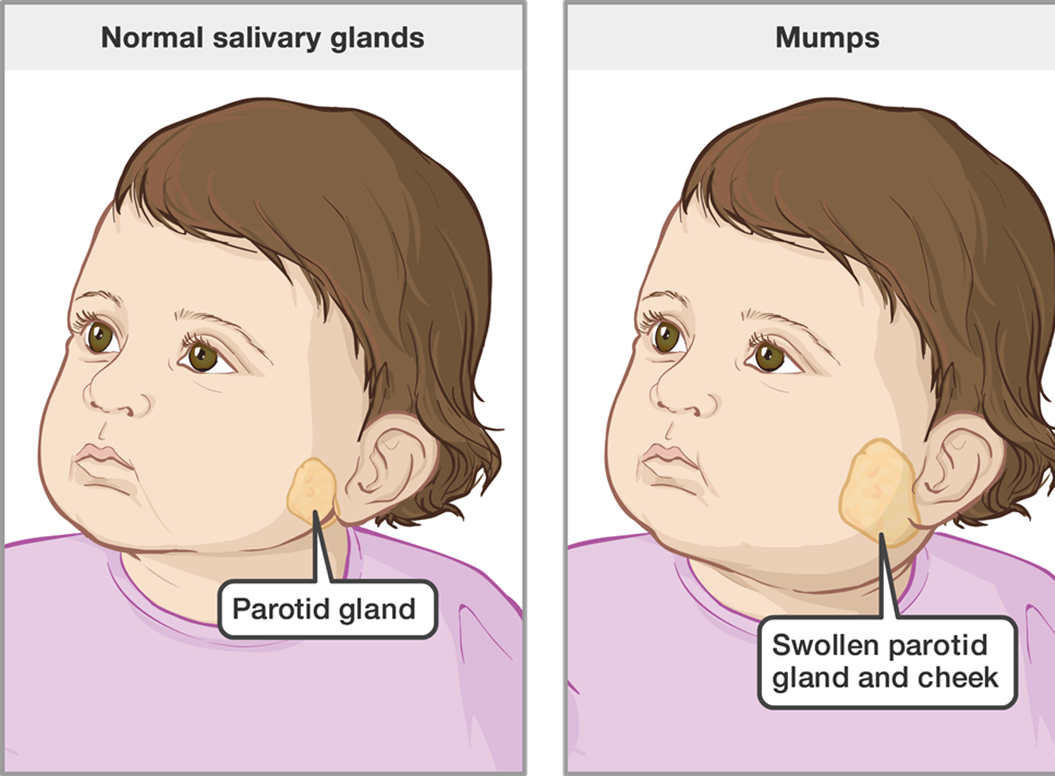A nurse is assessing an outbreak of mumps among school-age children. Using the epidemiological triangle, the nurse should recognize that which of the following is the host?
The vaccine.
The virus.
The school.
The children.
The Correct Answer is D
Choice A reason: The vaccine is not the host, as it is not a living organism that can be infected by the virus. The vaccine is a preventive measure that can reduce the risk of contracting mumps by stimulating the immune system to produce antibodies against the virus.
Choice B reason: The virus is not the host, as it is the agent that causes the disease. The virus is a microscopic particle that can only replicate inside the cells of a living host.
Choice C reason: The school is not the host, as it is the environment that facilitates the transmission of the virus. The school is a place where many children gather and interact, which increases the exposure and contact with the virus.
Choice D reason: The children are the host, as they are the living organisms that can be infected by the virus. The children are susceptible to the virus because they may not have been vaccinated or have not developed immunity from previous exposure. The children can also spread the virus to others through respiratory droplets or saliva.

Nursing Test Bank
Naxlex Comprehensive Predictor Exams
Related Questions
Correct Answer is C
Explanation
Choice A reason: Having the client's daughter communicate information about the procedure is not an action that the nurse should take. The daughter may not be a reliable or accurate interpreter, as she may have limited language skills, lack medical knowledge, or be influenced by her emotions or biases. The nurse should use a qualified interpreter who can ensure the confidentiality, accuracy, and completeness of the communication.
Choice B reason: Arranging for a member of the client's community to interpret the teaching is not an action that the nurse should take. The member of the client's community may not be a qualified or impartial interpreter, as he or she may have a personal or professional relationship with the client, or may have a conflict of interest or a hidden agenda. The nurse should use a professional interpreter who can maintain the boundaries, objectivity, and neutrality of the communication.
Choice C reason: Identifying the client's spoken dialect prior to contacting an interpreter is an action that the nurse should take. This will help the nurse to find an appropriate interpreter who can communicate effectively and respectfully with the client. The nurse should also consider the client's cultural background, preferences, and needs when selecting an interpreter.
Choice D reason: Using professional terminology when providing education prior to the procedure is not an action that the nurse should take. The nurse should use simple and clear language that the client can understand, and avoid using jargon, slang, or idioms that may confuse or offend the client. The nurse should also check the client's comprehension and ask for feedback throughout the communication.
Correct Answer is A
Explanation
Choice A reason: Early detection of disease is the primary goal of screening for lipid disorders, as it can identify clients who are at risk of developing cardiovascular diseases, such as coronary artery disease, stroke, or peripheral artery disease. Lipid disorders are abnormal levels of cholesterol or triglycerides in the blood, which can lead to plaque buildup in the arteries and reduce blood flow to the heart, brain, or limbs. Screening for lipid disorders can help diagnose and treat these conditions before they cause serious complications.
Choice B reason: Client enrollment in prevention programs is not the primary goal of screening for lipid disorders, although it is a beneficial outcome. Prevention programs are interventions that aim to reduce the risk factors or prevent the onset of diseases. Client enrollment in prevention programs may be a result of screening for lipid disorders, as clients who have abnormal lipid levels may be referred to programs that offer education, counseling, medication, or lifestyle modification.
Choice C reason: Promotion of appropriate lifestyle changes is not the primary goal of screening for lipid disorders, although it is a beneficial outcome. Lifestyle changes are behaviors that can improve health and well-being, such as eating a balanced diet, exercising regularly, quitting smoking, or managing stress. Promotion of appropriate lifestyle changes may be a result of screening for lipid disorders, as clients who have abnormal lipid levels may be advised to adopt healthier habits to lower their cholesterol or triglycerides.
Choice D reason: Identification of family history of medical problems is not the primary goal of screening for lipid disorders, although it is a beneficial outcome. Family history of medical problems is a genetic or environmental factor that can increase the likelihood of developing certain diseases. Identification of family history of medical problems may be a result of screening for lipid disorders, as clients who have abnormal lipid levels may be asked to provide information about their relatives' health conditions.
Whether you are a student looking to ace your exams or a practicing nurse seeking to enhance your expertise , our nursing education contents will empower you with the confidence and competence to make a difference in the lives of patients and become a respected leader in the healthcare field.
Visit Naxlex, invest in your future and unlock endless possibilities with our unparalleled nursing education contents today
Report Wrong Answer on the Current Question
Do you disagree with the answer? If yes, what is your expected answer? Explain.
Kindly be descriptive with the issue you are facing.
